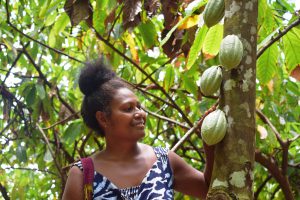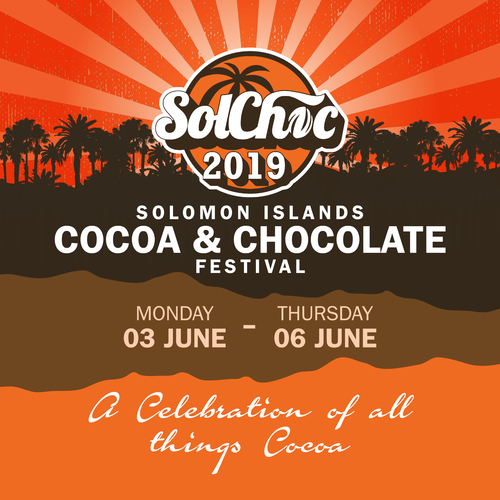A step of courage – A Solomon Island woman’s cocoa story

Lucy Kasimwane tends to her cocoa farm in Ward 9 in the Makira-Ulawa Province, Solomon Islands. Photo: Samantha Rina/PHAMA
Lucy Kasimwane had worked 20 long years in the city. So when she decided to leave her job, it came as a major shock to the people who depended on her: her family.
It was also a decision that took great courage.
But Lucy had a plan; a plan that would set her in the direction of her initial ambition and ultimately shape her lifelong dream to one day return home and contribute to the development of her community.
Less than a year since leaving her job, Lucy is relishing her new life as the owner of Lukasko Group, a private business involved in trading copra and wet cocoa beans.
Born and raised in Ward 9 in the Makira-Ulawa Province of the Solomon Islands, Lucy grew up developing a keen interest in agricultural commodities.
“I’ve been thinking about cocoa farming all my life. I’ve always had a passion for rural economic development so at a time when my children were in university and college, it was tough to make the decision to stop working and start a business,” she said.
“My passion was what drove me to come home and start this business. At the moment I’m currently applying for a cocoa export licence with CEMA (Commodities Export Marketing Authority),” she said.
As a businesswoman, Lucy has her share of challenges.
“This (cocoa) is a male-dominated field so coming into the business, I found it a bit challenging but I realise it’s very easy for women to go into cocoa farming. There was a training organised by PHAMA [the Australian and New Zealand Government’s Pacific Horticultural and Agricultural Market Access (PHAMA) Program] * and the Rural Development Program (RDP)** and a good number of farmers turned up for the training which covered harvesting, pruning and fermenting.”
PHAMA and RDP have been working with Solomon Islands’ partners including the Ministry of Agriculture and Livestock and the Commodities Export Marketing Authority to help farmers improve cocoa quality and their returns through initiatives like trialling solar drying and improved processing and handling techniques, as well as working with exporters on business skills and better understanding of international cocoa markets.
“As a woman I’d never done fermenting before and the training really helped me learn about new ways of processing and fermenting to get good quality cocoa. We learnt new things about fermenting and how to see that the beans are ready to go into the drier. The training also gave us good information and skills about cocoa trees from nursery to pruning and basically looking after the trees, so it has helped me to manage my farm better,” she said.
Lucy currently employs eight women who assist in harvesting, removing beans from pods and keeping the cocoa farms clean.
“One of my main goals is to encourage other women to take up cocoa farming or business. I really want to see women coming into the cocoa business, having their own farms and I’d like to help them earn a livelihood. Cocoa is good income,” she said.
The PHAMA program has connected Lucy to boutique chocolatiers in Australia interested in buying Solomon Islands cocoa.

